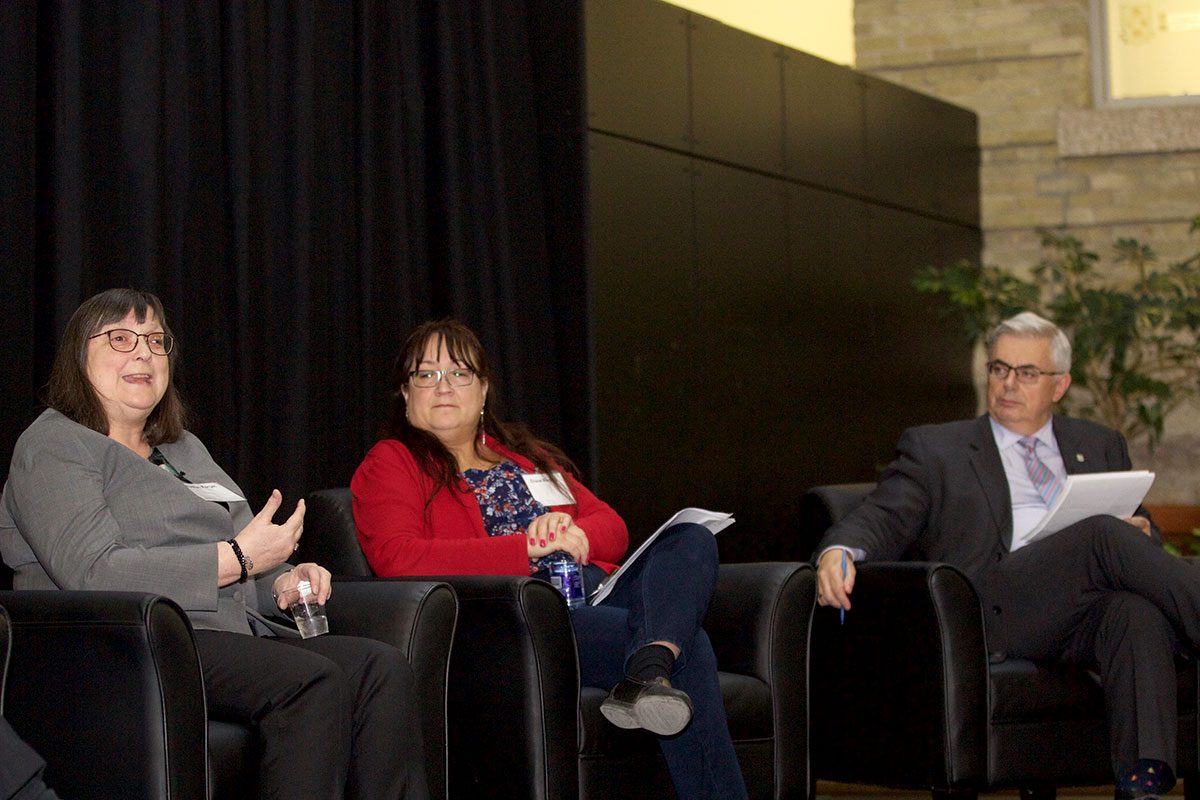
(right to left) President David T. Barnard at Visionary Conversations with panelists Diane Redsky and Evelyn Forget.
Visionary Conversations delves deep into the topic of poverty
Canada is a developed country with strong social values and programs. A country known for generosity — 3rd in the world according to the 2014 World Giving Index — where neighbours willingly and eagerly help neighbours.
And yet, some Canadians live in compromised conditions where heat and running water are a luxury. Children go hungry in this country, with nearly one in five of them living in poverty. It doesn’t add up. Especially when the impact of poverty affects all Canadians.
As Dr. David Barnard, president of the University of Manitoba, said at the Visionary Conversations event on Thursday, March 9: “Why can’t we get this right?”
Why do we allow poverty to persist in Canada?
A number of Manitoba’s community leaders dived deep into this issue — specifically the roles corporations, individuals, governments and non-profit organizations should play in helping to reduce poverty — in front of a packed Brodie Atrium on Bannatyne campus.
On hand to lead the discussion were: Donald Benham, manager of hunger and poverty awareness, Winnipeg Harvest; Evelyn Forget, professor in community health sciences, U of M; Susan Prentice, professor of sociology, U of M; Edward Kennedy, president and CEO, North West Company; and Diane Redsky, executive director of Ma Mawi Wi Chi Itata Centre.
One thing on which all panelists agreed was the complexity of the issue. There seems to be no easy answer to ending or reducing poverty, in spite of the relative wealth of our country. Though there was consensus amongst the panelists on who needs to step up: government.
We live in an era where fiscal belt-tightening and austerity are commonly accepted political norms, but Forget reminded that times have always been tough, and 30 years ago when people recognized the number of Canadian seniors living in poverty, change occurred — the Guaranteed Income Supplement (GIS) was introduced — because people took action.
“When we hold our governments accountable. When we insist they do a better job, we make progress,” she said. “So we know a good deal about how to solve poverty.”
Prentice followed suit, summing up the frustration that many have with the hands-off approach from government around issues like poverty: “We can and must expect better from our governments. For all of us, not just for the people in the one per cent,” she said to enthusiastic applause.
There was no shortage of ideas on how governments can make a difference. Benham, who said that as a food bank it was Winnipeg Harvest’s vision to close its doors and put itself out of business, made an impassioned argument for a society that provides basic human necessities.
“In a country with universal access to health care, why is there not universal access to food? Why should a place like Winnipeg Harvest continue to exist in a province like Manitoba, in a country like Canada, where we have such an abundance of food, an abundance of income?” he asked.
One barrier to reducing poverty, suggested many of the panelists, is the perpetuation of harmful stereotypes about poor people, which diminishes the appetite for systemic change. In other words, we just accept it.
“We have exactly as much poverty in this country as we’re willing to tolerate,” said Forget.
Does this sound familiar? Poor people should get off their butts and go get a job. They need to pull themselves up by their bootstraps and stop asking for handouts. They’re all lazy.
The reality is those stereotypes just aren’t true. And no one — regardless of their background or work ethic — is immune to the possibility of poverty, as Benham noted in retelling the story of a 30-year veteran of the Canadian Armed Forces who was deafened by an ordnance explosion and dismissed from the service only to end up in poverty in Winnipeg. “No shame. No blame. No judgment. It could happen to anyone.”
The stereotypes get even deeper and more pernicious when Indigenous people are involved, as Redsky notes.
“In the Indigenous community, racism plays a huge role in creating poverty. Until we solve those real systemic issues, it’ll always be two steps forward, five steps back,” she said.
Several members of the audience came forward to share their own stories of poverty and struggle adding a very human tenor to an already emotional evening.
If a solution is to be found, the panelists agreed that all partners — not just government and NGOs — need to be brought to the table; the “common table” as Redsky called it.
“The first thing I do now is look around the table and ask, who’s missing? It’s not just a one-system issue with one way of resolving it. It needs all hands on deck. And I would add, just from sitting here tonight learning incredible amounts from the panelists, to add researchers to the table because of their wealth of knowledge,” said Redsky.
Kennedy said that the private sector shouldn’t be forgotten, as they can be tapped for their expertise in innovating solutions.
And, of course, the people affected by poverty themselves need to be there.
“It’s important to carry on a respectful dialogue [with people in poverty], to ask questions and listen, not just swoop in with a bunch of answers,” said Benham. “Work with folks to ensure that the answers you’re developing are truly in accord with their experiences of hunger and poverty.”
Read more about Visionary Conversations.
Follow the conversation on Twitter using #umvisionary






